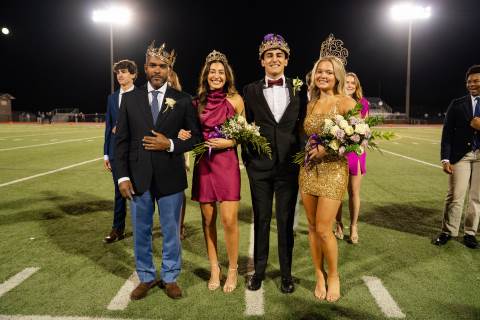As Homecoming Court elections come to an end, questions swirl around whether the process truly reflects student voices. Students voice their opinions, which entail the process of the ballot, what happens when selected, and how it works.
“I’ve never been on the ballot, but if you’re popular and close to boarding students, it’s easy access. They also put our legal names on the ballot; if you go by two names, people aren’t familiar with just your legal name. For example, mine was, but I go by Kaitlyn. I also know that other people’s names were put incorrectly,” sophomore Kaitlyn Keeling said. “Additionally, I think if you’ve gotten it once or twice, you shouldn’t be allowed to get it again.”
This difference in perspective shows how students view the fairness of the homecoming court process in different ways. While some feel that popularity influences the outcome, others see it as a reflection of kindness and positivity among peers.
“I’ve been selected for the first time this year, and I’ve also noticed that it’s usually the same people since freshman year,” junior Hugo Enander said. “However, for good reason, since most of them are well-liked people and are nice to everyone, I can see why they get it. When I got the email about the homecoming court line-up, I was just as surprised as everyone else because we didn’t get a heads-up or anything, but I’m excited.”
While some students are new to the experience and view the selection process with excitement and surprise, others have noticed repeating patterns over the years. This contrast culminates how perspectives can shift depending on how familiar someone is with the homecoming ballot process.
“I have been on the ballot now twice, including this year. I’m just a sophomore, so I’ve only seen two of the ballots, and they were pretty similar. Especially in the first round, it had the same four people. One thing I would like to change is that the football players, if they get elected for homecoming for it, I think they should walk out instead of their dads, because some people don’t want to walk with a random adult,” sophomore Ivey Dunn said.
As new students experience the process for the first time, their outlook often meshes excitement with curiosity about how fair the system truly is. This brings a new perspective, hoping for inclusivity in the future and ending old patterns.
“I’m a freshman, so I have been picked for the first time, and I’m so excited. Unfortunately, I honestly think it might tend to be the same people for the next four years. I hope that I’m wrong, though, and many people continue to get it too, as well. However, I do think it’s a relatively fair process, but sometimes it might be kind of biased,” freshman Olivia Crane said.
While some underclassmen question whether the same students will continue to be chosen, others with more experience have seen a wider variety over time. Upperclassmen often notice how involvement and shifting social dynamics can open opportunities for new faces each year on the ballot.
“I have been on homecoming court for the past two years, now including this year,” junior Rayan Noor said. “Throughout my years of experience, I have seen different people most of the time. I think this for two reasons only: one, that there are more slots, and the social structure of the school is constantly changing, and people are getting more involved. When people see that, they feel more connected to those people. Once you’re selected, they ask if you’re comfortable with it, then you go out there to represent your class and have fun.”
As students progress through high school, their experiences with homecoming court often evolve along with their class dynamics. While underclassmen may notice change and variety, upperclassmen like senior Toby Burns reflect on long-term patterns within their own grade.
“I got picked last year, and this is my first time on it instead of just the elimination rounds. For the senior boys, Miles Twyman has been on it all four years, and most of us are on it every other year, to be honest. For example, I was on it junior year but not my freshman or sophomore years. So I’d say it’s different, at least for our grade,” Burns said.
Amongst the seniors, experiences with homecoming court can vary just like the other grades, with some noticing consistent patterns, while others see small changes each year. These perspectives show how students pay attention not only to who is selected, but also to the structure and fairness of the voting process like Noor stated earlier.
“This is my second time on the court, my junior year and now senior year,” senior Sophie Piller said. “Every year, there is a slight difference on the ballot, but it’s mostly the same. What I do know for sure is that the guys were more different this year, the girls stayed the same. One thing I think should change about the process is that, in the voting rounds, you go from your whole class to 12, then to eight, and then from eight to six. It should just be two people cut off per round.”

